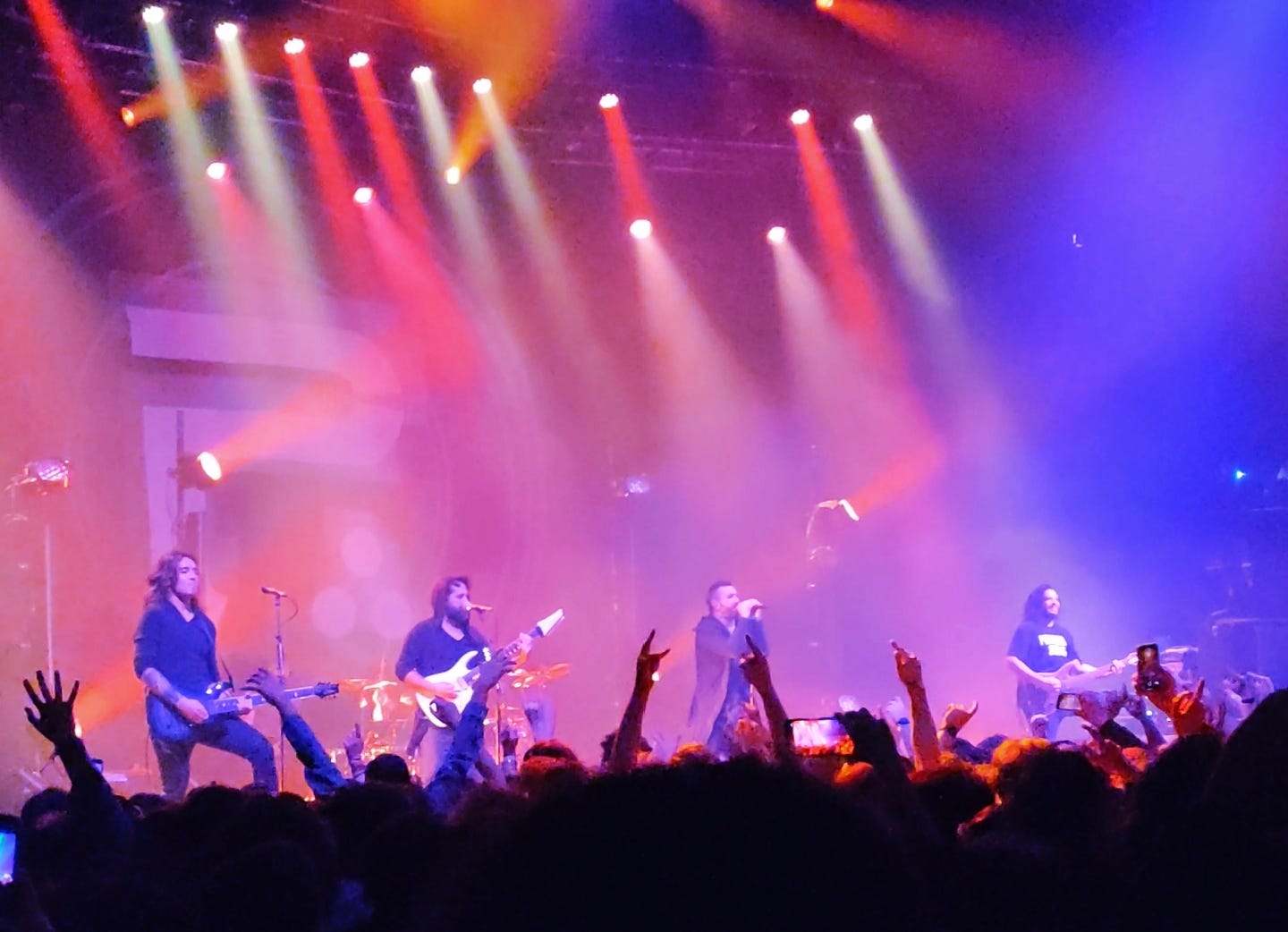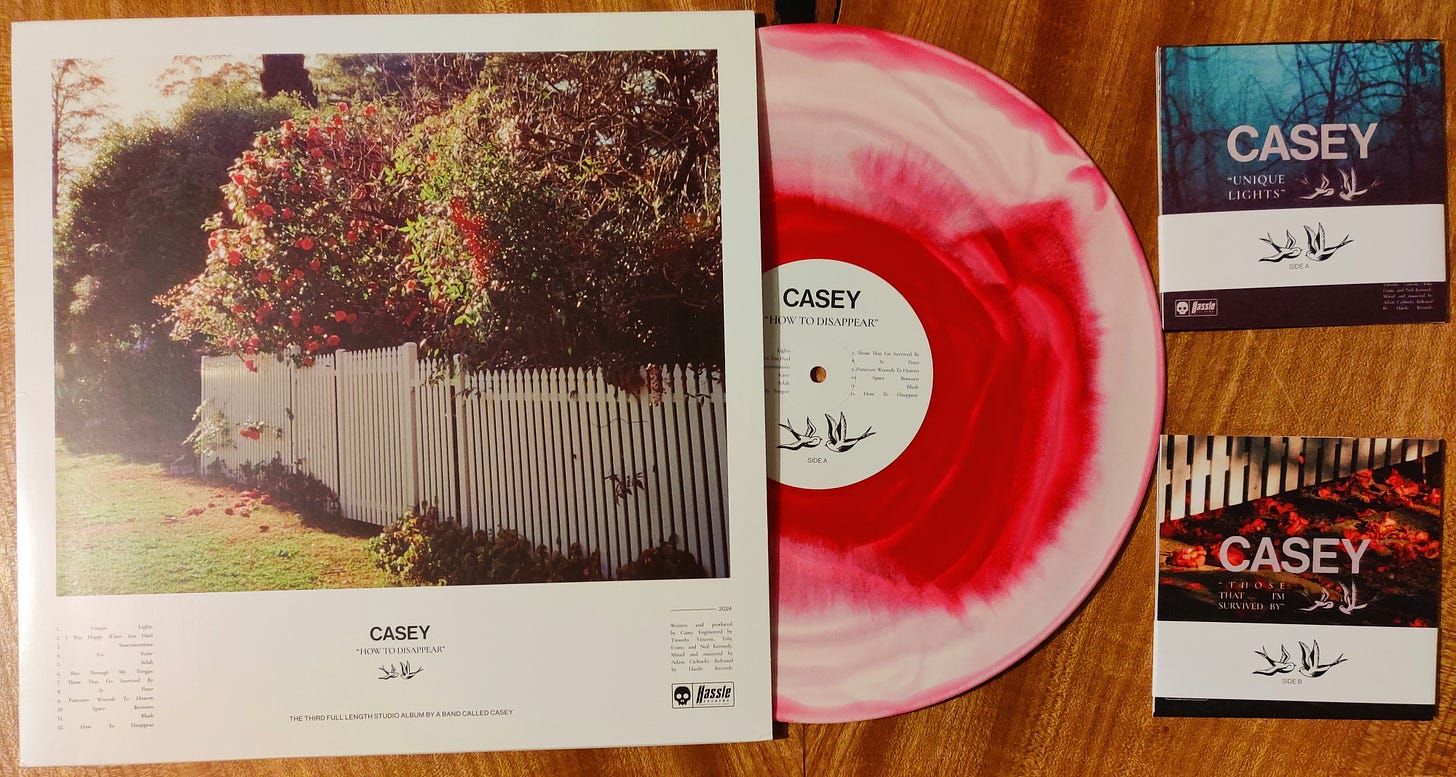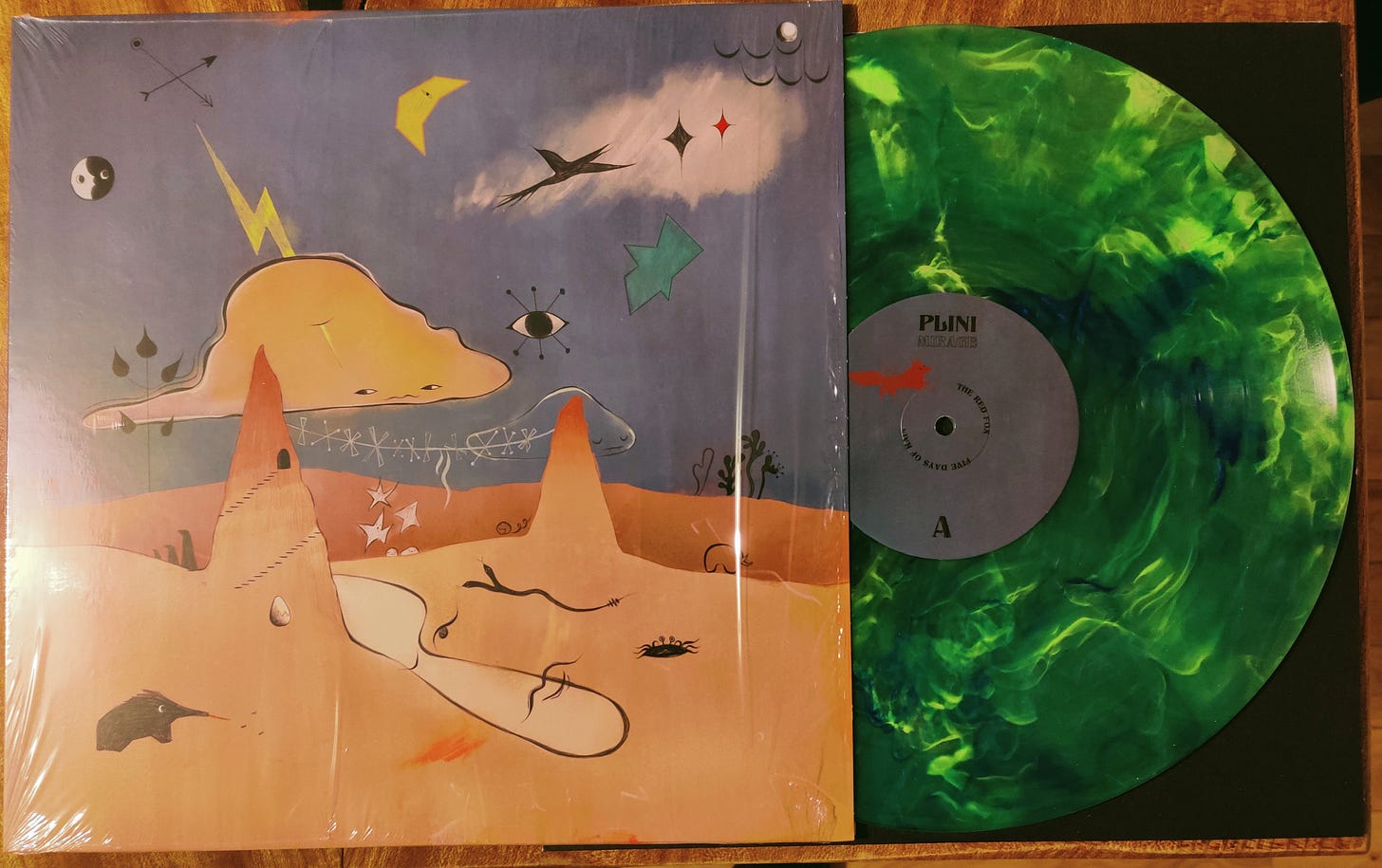February 2024: Post- Is Not A Genre
Keeping that low end tight... with Periphery, Casey and Plini
Just under the wire for February - got a little delayed this month. But - we have a new logo! Thanks very much to Ben Parker and his expert graphic design skills. Check his work out at @26hitcombo on Instagram. And as usual, scroll to the bottom for this month's playlist.
To all the bassists I’ve loved before
This month I saw Periphery live for the first time. They were good - there’s a review below. Both acts on the bill adopt an increasingly prevalent trend of having no bassist in the band - they’re not the first in this newsletter either.
For a long while your meat-and-drink of rock music was the guitar/bass/drums combination. Guitars and drums (in one form or another) have existed for centuries - but the bass guitar is a much more recent invention, first created in the 20th century. Before that, you had your double bass and your oversized tubas holding up that low end; the electric age of music brought new possibilities and a new approach, not least the advantages of both size (those double basses are heavy!) and reliability (a pickup is a lot easier to get to work on a bass guitar than setting up a mic on a string instrument). Convenience leads to new convention which leads to innovation and suddenly everyone wants a Paul McCartney-style violin-shaped bass guitar1.
The amplified music revolution trudges on and we start to get some variations - The Doors famously eschewed the bass guitar in favour of Ray Manzarek covering those frequencies on keyboards. Synthesizers and digital technology take off and suddenly the sonic palette is endless, and before long the hegemonic structure of “the band” in popular music is gone, replaced by a diffuse range of genres eyeing each other suspiciously until a new generation comes of age in the streaming era where limited pocket money was no longer a barrier to multi-genre subscription and… Okay, gone off track there a bit. But rock music and its affiliates and subgenres (metal, indie, everything we’d label under Post-) still rely on the bass guitar. Well, mostly.
That digital music revolution opened up a huge range of possibilities to producers and musicians previously inaccessible. Do you want to fill out the low end in a song in the 1960s? Beyond a bass guitar, your options are pretty limited (and expensive), unless you’re willing to fork out for a massive pipe organ or hire a tuba player. VST instruments and digital synths open up a whole range of possibilities that years before would have been unthinkable (or unthinkably expensive), and inevitably lead to the majority query on most audio mixing forums being “Help - my mix sounds super muddy, how can I fix?”
Because - and this pains me to say as a longtime guitarist and lover of those fiddly tremolo lines and splashy cymbals - humans love bass. Yeah okay, lots of the conventionally interesting melodic stuff happens around the 200Hz-2kHz mark, and there’s a place for the “overhead” frequencies in the treble above that. But it’s the thwomp of a kick drum, the groove of a bass line, the overpowering, subwoofer-ripping hit of a “bass bomb” that drives that human sense of rhythm, or powers the feeling of “heaviness”.
Speaking of heavy - as the subgenres of metal proliferated in the ‘90s and 2000s, bands sought ever-increasing ways to increase their own “heavy quotients” - double kick pedals, harsher screams, faster riffs (thrash), slower riffs (doom). One easy trick bands increasingly hit on was to tune their guitars lower - down from E Standard to Drop D, or down a whole tone, or Drop C. Before long, 7-string guitars with a low B string became commonplace. The arms race continued - Drop A, Drop A flat. Meshuggah decide to blow everyone else out of the water by going for the 8-string guitar - unlocking riffs and notes a whole octave below a six-string in standard tuning, ground ordinarily reserved for the bass, and go on to popularise the “djent” sound, more of which bleeds into other genres like metalcore year on year.
What does the bass do in this case? You can whack thicker strings on an electric guitar and reach those frequencies, but there’s only so much further down you can go with a bass. (The rattly, loose-string sound of Korn’s bass guitar, whilst fairly iconic for that branch of nu-metal, doesn’t sound good). Add to that the challenge of mixing when all your instruments are playing in the same low-frequency space, and the answer becomes clear - why even bother with the bass guitar?
I did enjoy seeing Periphery live, and I was in a slightly ornery mood over the sound engineering due to the abysmally poor setup for the opening band. But there were sections where, even with a triple 8-string guitar assault, some of the heavy breakdown riffs just didn’t hit as hard as they might have. The point of Periphery is electric guitar maximalism - and that’s a fine and worthy goal! But there is a joy to the underappreciated art of bass guitar - whether it’s in subtle melodic textures, an infrequent but well-judged use of a bass chord, or just in setting that pulse of anticipation that an electric guitar, no matter how low-tuned, just can’t replicate. It’s perhaps no surprise that jazz is far more accepting of the sonic palette of the bass guitar, in the funk jams of Thundercat or the time-bending fusion of Sungazer’s Adam Neely. TesseracT, to their credit as a djent band, drive much of their music through Amos Williams' bass playing - though this requires significant acoustic sculpting to get working and is itself an acquirted taste.
So yes - we may have strictly evolved past the need for the bass guitar, even in the guitar-based genres. But I think we abandon the bass guitar wholesale at our peril. Even if that means letting our younger siblings join the band.
From the Pit: Periphery
Roundhouse, London, 3rd February 2024
I mentioned in last month’s article that I was struggling to come up with reasons why I wasn’t a super-fan of Periphery, given how much of their shtick is firmly in my wheelhouse and the slickness of their execution. I still don’t have a good answer to this after seeing them live?
This was the biggest headlining UK show to date for the band, selling out a packed Roundhouse despite the impact of various train strikes. The triple-guitar assault of Misha Mansoor, Mark Holcomb and Jake Bowen is clearly in fine form - adeptly shredding throughout the crazy lead lines of Marigold, or navigating the polyrhythmic pedal riffs of Atropos over Matt Halpern’s busy drum kit.
Given all this, it’s perhaps surprising that my favourite part of Periphery is Spencer Sotelo’s vocals - the man is a powerhouse of screams and high-pitched belting, as well as having a compelling natural singing voice. Of course, at the end of a long tour of UK and Europe, his throat was in agony, and some punches were pulled to protect what must be raw and fragile vocal chords. The full range of clean vocals got an extensive workout during an acoustic performance of Scarlet, with the rest of the band stepping offstage to let YouTube virtuoso Mike Dawes play a delightful fingerstyle arrangement.
The odd thing about Periphery is that they’re essentially quite a cheesy band. In the realms of metal, cheesiness is usually associated with the progressive side - the likes of Dream Theater, Haken, Voyager (hell, the latter were on Eurovision, it doesn’t get cheesier than that). Periphery are not a prog band - they just don’t have that sound, there’s too much of that metalcore energy in them underneath the technicals. But they wear their hearts on their sleeves, are unabashedly nerdy in their songcraft, and are unafraid to do a big soaring chorus - and, most importantly, they’re having a ton of fun doing it. Super serious attitudes in metal are all well and good, but sometimes it’s fun to just have a blast.
Proceedings were opened by Crooked Royals, hailing from New Zealand. I think they were good? A lot was happening on stage with guitar-tapping heroics, busy drums, and dual vocalists trading barbs and belts on stage. Sadly, their sound technician was fully asleep at the wheel, with the drums mic’d incorrectly, the guitars flat against the backing tracks, and the vocal levels under constant over-adjustment throughout the set - please get a better sound tech guys, you deserve so much better.
On Rotation: Casey - How To Disappear
Released 12th January 2024 on Hassle Records
The main reason I primarily write about post-rock and related genres is because they're awesome. A cynical secondary reason I write about these genres is that they're often instrumental and I seldom write about lyrical content. Don't get me wrong; I'm not an unfeeling android, and I'm not quite at the point where a soaring melody can only get me to nirvana if it's picked really, really fast on a guitar. Maybe it's my mathematical bent, or the fact that English literature was always an underperforming subject for me at school (along with biology, but chalk that up to a combination of queasiness and chronically low blood sugar), but beyond the obviously visceral I can find some poetry to be a cipher to which I lack the key.
Maybe that fuels the personal appeal of Casey and their heart-on-sleeve brand of emo - at turns both complex and plainly devastating. Their first iteration saw two albums and reasonable success, mixing post-hardcore and the mid-2000s riffs of Hawthorne Heights with the verbosity of bands like La Dispute, and giving rise to the most unabashedly delivered emo lyric of all time on Little Bird: “Our hearts lay on the bedroom floor / And one was mine, but both were yours”. Second album Where I Go When I Am Sleeping was submerged in a claustrophobic fog of depression, reflecting frontman Tom Weaver's struggles with physical and mental health. The band split at the end of that year.
Fast forward four years and we have a reunion, a couple of excellent singles, UK and US tours, and now third album How To Disappear. Where their first album was all angst and riffs, and the second atmosphere and depression, this latest effort feels propulsive, fuelled by brightness and energy even with the dark subject matter retained - it's a shift that the band wears well, the combination of those shoegaze influences with full-on rock energy making this easily their strongest musical effort to date.
Nowhere is the shift more evident than in the vocals - which veer fully into belted arms-in-the-air choruses to dramatic effect, no more so than on the cathartic For Katie and Bite Through My Tongue, which hark back to that era of mid-2000s emocore but without the naive American whinge and more gravitas (“When I look back I only see an apoplectic wreck / Numb behind the eyes and scared to death”). There's still room for the occasional furious screams accenting the most intense moments (the bridge of Those That I’m Survived By is sublime), and for the understated lower registers that filled that second album (and adorn the beautiful Selah here, its tale of religious abandonment in the face of personal tragedy evolving into a forlorn chant of “How could I know peace?”). The advanced vocabulary used throughout masks a stark plainness to the lyrics - almost naked in their assertions of love, loss and hope as a stream of consciousness.
It's an incredibly confident effort - retaining all that was fantastic about Casey's first iteration but adding a clarity, maturity and, hell, even a bit of levity to proceedings. There's no need to be afraid of not understanding, after all.
Listen on Spotify | Listen on TIDAL
Bonus Spin: Plini - Mirage
Self-released 1st December 2023
The morning after the big year-end review - a time for sore wrists, social media discourse, and burning shame at the discovery of a bunch of last year’s music you inevitably missed on release. So yes, apologies to the banging hyperpop of Frost Children (you made the playlist this month though). But said shame is compounded when it’s an EP from what is probably your favourite guitarist.
Anyway - new Plini. We’re over a decade into his musical career, with two full-length albums and a whole host of EPs, remixes and guest spots, all following the typical recipe of frenetic rhythms in odd time signatures, cathartic synths and that sweet guitar tone played with delightful progressive virtuosity. This new EP, Mirage, definitely belongs more to the camp of consistent formula than wholesale reinvention. But there are some green shoots of evolution here, particularly in the opener The Red Fox, which unfolds with clear evocative intent in telling a story through its musical progression. So too for the closing track Ember, which practically dances around the speakers with its jig-like riffs and swing rhythms before culminating in a heavy but bright breakdown. If you’re not a fan of his previous efforts this probably won’t convert you - but for me, it deserves a (retroactive) high charting place on last month’s edition.
Listen on Spotify | Listen on TIDAL
Also out this month is Bipolar Architecture’s Metaphysicize, a relentless slab of black metal, evoking the best of DVNE but with harsher screams and occasional thrillingly jarring syncopation. Genuinely superb, if you can stomach it. Spotify | TIDAL
This Month’s Playlist
Okay, a small fraction of everyone. Presumably, younger siblings of guitarists that want to be in the band. Look, it’s killing me to write an article defending the bass guitar after years of mockery and memes, so just take the hit, folks.








